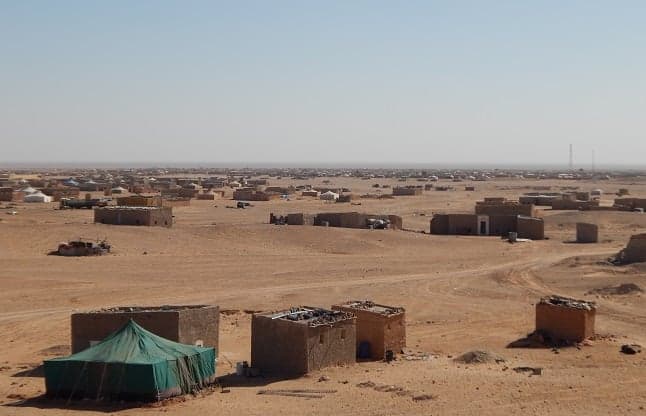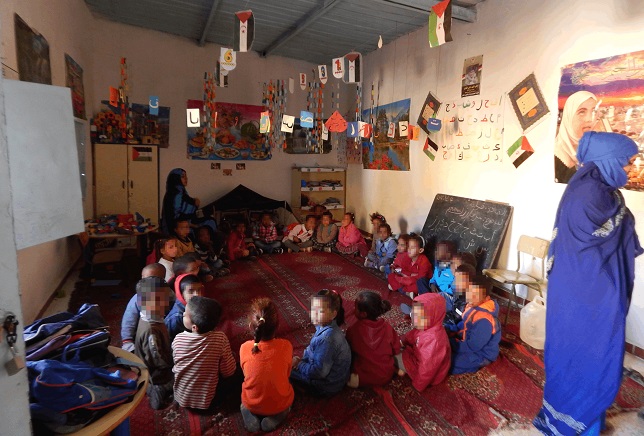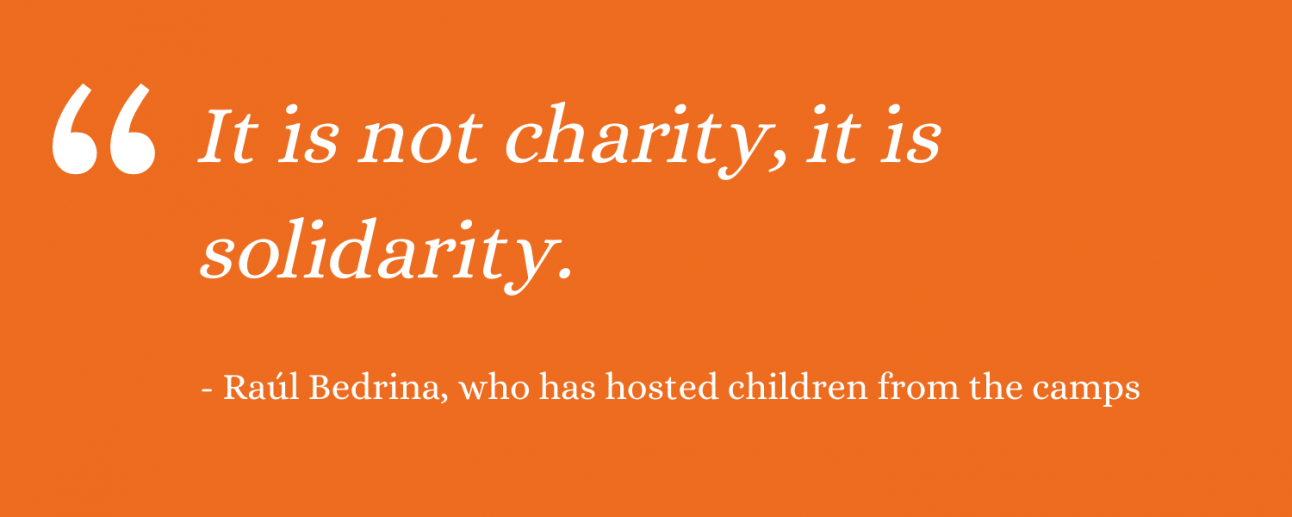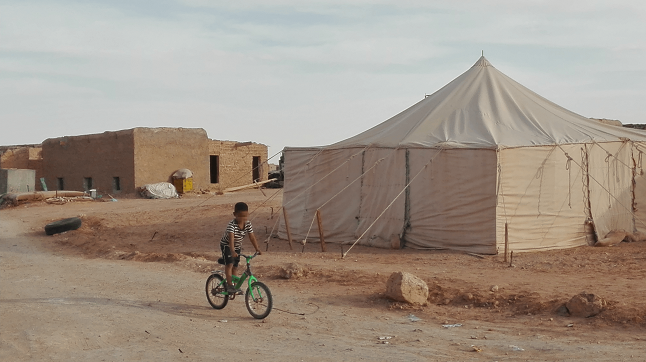A cultural exchange programme for the ‘forgotten Spanish colony’

The people from Western Sahara have been fighting for their independence for decades. Under the control of Spain for over a century until 1974, Western Sahrawis were able to have a Spanish National ID and passport, to serve as public servants and in the army, with the western Sahara declared by fascist dictator Francisco Franco as the 53rd province of Spain.
This article is part of Changing the Narrative. Articles in this series are written by student or early career journalists who took part in The Local's training course on solutions-focused migration reporting. Find out more about the project here.
In 1974, after pressure from the UN, Spain agreed to a referendum to accept the Sahrawis’ right to self-determination. But when Morocco, supported by France and the U.S., invaded the country, Spain abandoned the Sahrawis. Nowadays, 80 percent of their country is occupied by Morocco, and hundreds of thousands of its citizens are stranded in refugee camps in Algeria. The result is that people living in this region are denied the same rights given to other former colonies, such as the ability to claim Spanish citizenship.
Today, the fifth of the country that is not controlled by Morocco is known as the Sahrawi Arab Democratic Republic (SADR) and it is governed by the Polisario Front, recognised by 46 governments around the world, although none in the EU. In Spain, some local organisations and public figures campaign for their government to support the Sahrawi people.
"Spanish citizens have stood next to the Sahrawi people for 45 years because they understand that Spain has a political and legal responsibility with the Sahrawi people, but they see their political leaders incapable of amending this error. It is the great divorce in Spain," Abdulah Arabi, the Polisario Front Delegate in Spain said, "Spaniards are holding a responsibility that belongs to their government."
At the time of the interview with the Sahrawi Delegate, Abdulah Arabi expressed concern that they were closer than ever to a break of the truce. Two weeks later the truce broke. "We have generations that have been born in refugee camps waiting for the UN to apply their peace plan so their parents and grandparents can decide what they want to be."

Photo: Sonia Clemente
Holidays in Peace
One of the most successful programmes trying to both improve the conditions of the Sahrawis in refugee camps and to bring awareness to the conflict is Holidays in Peace. It allows Sahrawi children living in Algerian refugee camps, in one of the roughest deserts in the world, to live in Spain for the summers with host families.
This programme allows kids to avoid the desert heat, and access medical treatment and check-ups. It also helps them to learn Spanish, the second official language of the SADR.
The programme began in 1976 with just a handful of children, and only three years later, 100 children spent their summers in Spain. In the 1980s the initiative gathered institutional support from the SADR government and several Spanish civil associations under the umbrella of "Friends of the Saharawi People."
By the early 2000s, thousands of kids would travel every summer.
"In the good year before the 2008 crisis when the [Spanish] government donations were larger, we were able to bring up to 10,000 children every summer," Arabi said.
Many of these children come back for several summers and stay with the same families again. When the children return to the camps, the host families often visit and send care packages. The associations also send vans full of supplies a few times a year to the camps.
MORE IN THIS SERIES:
Raúl Bedrina, who joined one of the associations in Madrid, and later helped to create the Gdeim Izik association in the south of the Spanish capital, hosted a child for the first time eight years ago.
"It is not charity, it is solidarity. These children are the best ambassadors of the Sahrawi people, who share a common history with us," he said.
Western Sahara is the only Arab country with Spanish as a co-official language. However, the language barrier is still a challenge for the children, as they only began studying Spanish around the same time that they travel for the first time.
"At that age, kids are like sponges, in two months they are fluent," Bedrina said, "but we put in the effort, too. Every day for one or two hours before going out or to the pool, we would sit with a picture dictionary and helped him."
Bedrina talks about the cultural shock the children suffer when they arrive. The first thing they want to do is call home.
"Our kid went to bed crying for days because he missed his family. It’s also very odd for them to see things like a refrigerator, and they keep checking to see if things are still cold," he said. They are also used to much more independence, to just go out a run around without supervision "but if only because of traffic, that is not possible here."
"The ties you, as a host family, establish with the family are very strong. They are sending their children to a house they don’t know, so they want to know you." Many of the host families visit the camps to meet the Sahrawi family, and the families want to send their other children to the same host family. "Our kid was the one who sold us the idea to host his younger sister. He took us for a ride," Bedrina remembers, laughing.
Each host family is assigned a Sahrawi family, and they get to know each other as part of the process.

These children are not orphans, they have families who love and care for them, and it has to be made clear to the host families that the children will come back to their families after the summer. There are other programmes for teenagers who come to study in high schools during the school year and who go back home for the summer, but it is a much smaller programme.
The 2008 economic crash affected the programme a lot. Local governments cut the funding given to each association and they found it harder to fundraise money during the year. Many families who had hosted kids in the past couldn’t host those years because they were suffering from unemployment or financial troubles.
Most host families are middle class and the weight of an added member in the household was too much for many of them. "Kids come with nothing," Bedrina said, "you have to give them clothes, food, et cetera..."
Because of this, the number of years the children would travel was reduced from five to three, so more children could continue to travel. However, it still cut the number of children able to travel by more than half for some years. Things had started to improve in this respect, but then Covid-19 hit.
An outdoor prison
The conditions in the desert are very dire. "There is no vegetation, no water, and temperatures go higher than 50 degrees," Arabi said.
Before Covid-19, there were two times a year where host families could travel to the camps, around Easter around Christmas. For Bedrina, and many families, although hosting a child has been quite an experience, nothing compares to visiting the camps, and seeing the conditions.
"All Westerners should go and see a refugee camp to open their minds about what is going on in the world. I have seen colleagues go there and feel completely overtaken by the injustice and the world would fall on them. It was too much for them," he said. Bedrina has been three times to the camps, not only meeting the families but also interviewing women about their vision on the conflict for a documentary and bringing humanitarian aid collected in Spain.

Photo: Sonia Clemente
Bedrina described the camps where Sahrawis have been living for 45 years as "a giant outdoor prison. It is difficult to describe with words."
"The first days there I thought I had a cold because I was having trouble breathing, but then I realized it was the sand dust I had been swallowing all day," he said
David Pobes, another volunteer in an association also travelled by car to the camps to take donations gathered in Madrid. He lived with the family he had been in contact with. "You live with them, and you can see they have nothing. The homes usually have two rooms. Not two bedrooms, two rooms. There is no furniture and they sleep on the floor. While you are there you eat with them, cook with them, and clean with them," Pobes said.
'Saved many lives'
While the main objectives of Holidays in Peace are building awareness of the Sahrawis’ situation, and to take the children away from the camps during the hot summers, one of the key aspects that have helped save lives is the access to better medical care and nutrition during the summer.
Healthcare is a scarce resource in the camps. "We have a Ministry of Health that guarantees health in all the towns in the camps. But the dispensaries are indeed basic," Arabi said. When David Pobes visited one of the clinics in the camps, he was surprised by it: "in one room, they had an old gas refrigerator for insulin. That was the best technology I saw."
The clinics are meant mostly for first aid. If it is more serious, the patient must go to the province hospital or the national hospital. If it is even more serious, they must be transported abroad. However, access to specialized medicine is rare.
MORE IN THIS SERIES:
During the summers in Spain, the children get a full check-up with a blood test and access to specialists. "Thanks to these check-ups we have been able to save many lives of children who are now living a normal life, thanks to this programme," Arabi said.
Spain has universal healthcare, meaning that the children can access the Spanish healthcare system upon arrival. Children in the camps suffer from hearing and sight problems because of the sandstorms. "You wouldn’t believe the stones that I have seen taken out of these children’s ears. Stones!" Pobes said.
When it comes to sight problems, the associations run fundraisers the entire year not only to cover the €600 flight but also glasses these kids might need. Some optometrists provide the glasses for free for these kids, but unfortunately, there are not enough.
Adapting to the pandemic
Due to Covid-19, the programme was cancelled for the first time since it began decades ago.
To alleviate the effects of not running the programme, the Polisario Front came up with an alternative list of events in the camps. During July and the first half of August children in the refugee camps have taken part in cultural and sports activities.
"We have done practically everything they would do here, such as medical check-ups, but, of course, conditions are not the same, as structures are fragile there." Arabi said.
They took part in poetry and music workshops, football, cross country, and a programme of exchanges with older people who told them their life stories. They have been able to offer this version of the programme to all the children in the camps, around 9,000.
In August a group was taken to the liberated territories. It was the first time they could see them. Arabi said the programme was a bit rush, as they couldn’t be sure what the Covid conditions were going to be or if they would be able to do it at all, "but the results have been good."
The plans for next summer remain uncertain, but the hope is that it will be able to return to its usual format, providing many children with a connection to a Spanish host family, language lessons, medical care and a break from life in the camps.
Thess Mostoles is a Spanish journalist currently living in the UK and reporting on international politics, war and conflict.
Comments
See Also
In 1974, after pressure from the UN, Spain agreed to a referendum to accept the Sahrawis’ right to self-determination. But when Morocco, supported by France and the U.S., invaded the country, Spain abandoned the Sahrawis. Nowadays, 80 percent of their country is occupied by Morocco, and hundreds of thousands of its citizens are stranded in refugee camps in Algeria. The result is that people living in this region are denied the same rights given to other former colonies, such as the ability to claim Spanish citizenship.
Today, the fifth of the country that is not controlled by Morocco is known as the Sahrawi Arab Democratic Republic (SADR) and it is governed by the Polisario Front, recognised by 46 governments around the world, although none in the EU. In Spain, some local organisations and public figures campaign for their government to support the Sahrawi people.
"Spanish citizens have stood next to the Sahrawi people for 45 years because they understand that Spain has a political and legal responsibility with the Sahrawi people, but they see their political leaders incapable of amending this error. It is the great divorce in Spain," Abdulah Arabi, the Polisario Front Delegate in Spain said, "Spaniards are holding a responsibility that belongs to their government."
At the time of the interview with the Sahrawi Delegate, Abdulah Arabi expressed concern that they were closer than ever to a break of the truce. Two weeks later the truce broke. "We have generations that have been born in refugee camps waiting for the UN to apply their peace plan so their parents and grandparents can decide what they want to be."
![]()
Photo: Sonia Clemente
Holidays in Peace
One of the most successful programmes trying to both improve the conditions of the Sahrawis in refugee camps and to bring awareness to the conflict is Holidays in Peace. It allows Sahrawi children living in Algerian refugee camps, in one of the roughest deserts in the world, to live in Spain for the summers with host families.
This programme allows kids to avoid the desert heat, and access medical treatment and check-ups. It also helps them to learn Spanish, the second official language of the SADR.
The programme began in 1976 with just a handful of children, and only three years later, 100 children spent their summers in Spain. In the 1980s the initiative gathered institutional support from the SADR government and several Spanish civil associations under the umbrella of "Friends of the Saharawi People."
By the early 2000s, thousands of kids would travel every summer.
"In the good year before the 2008 crisis when the [Spanish] government donations were larger, we were able to bring up to 10,000 children every summer," Arabi said.
Many of these children come back for several summers and stay with the same families again. When the children return to the camps, the host families often visit and send care packages. The associations also send vans full of supplies a few times a year to the camps.
Raúl Bedrina, who joined one of the associations in Madrid, and later helped to create the Gdeim Izik association in the south of the Spanish capital, hosted a child for the first time eight years ago.
"It is not charity, it is solidarity. These children are the best ambassadors of the Sahrawi people, who share a common history with us," he said.
Western Sahara is the only Arab country with Spanish as a co-official language. However, the language barrier is still a challenge for the children, as they only began studying Spanish around the same time that they travel for the first time.
"At that age, kids are like sponges, in two months they are fluent," Bedrina said, "but we put in the effort, too. Every day for one or two hours before going out or to the pool, we would sit with a picture dictionary and helped him."
Bedrina talks about the cultural shock the children suffer when they arrive. The first thing they want to do is call home.
"Our kid went to bed crying for days because he missed his family. It’s also very odd for them to see things like a refrigerator, and they keep checking to see if things are still cold," he said. They are also used to much more independence, to just go out a run around without supervision "but if only because of traffic, that is not possible here."
"The ties you, as a host family, establish with the family are very strong. They are sending their children to a house they don’t know, so they want to know you." Many of the host families visit the camps to meet the Sahrawi family, and the families want to send their other children to the same host family. "Our kid was the one who sold us the idea to host his younger sister. He took us for a ride," Bedrina remembers, laughing.
Each host family is assigned a Sahrawi family, and they get to know each other as part of the process.

These children are not orphans, they have families who love and care for them, and it has to be made clear to the host families that the children will come back to their families after the summer. There are other programmes for teenagers who come to study in high schools during the school year and who go back home for the summer, but it is a much smaller programme.
The 2008 economic crash affected the programme a lot. Local governments cut the funding given to each association and they found it harder to fundraise money during the year. Many families who had hosted kids in the past couldn’t host those years because they were suffering from unemployment or financial troubles.
Most host families are middle class and the weight of an added member in the household was too much for many of them. "Kids come with nothing," Bedrina said, "you have to give them clothes, food, et cetera..."
Because of this, the number of years the children would travel was reduced from five to three, so more children could continue to travel. However, it still cut the number of children able to travel by more than half for some years. Things had started to improve in this respect, but then Covid-19 hit.
An outdoor prison
The conditions in the desert are very dire. "There is no vegetation, no water, and temperatures go higher than 50 degrees," Arabi said.
Before Covid-19, there were two times a year where host families could travel to the camps, around Easter around Christmas. For Bedrina, and many families, although hosting a child has been quite an experience, nothing compares to visiting the camps, and seeing the conditions.
"All Westerners should go and see a refugee camp to open their minds about what is going on in the world. I have seen colleagues go there and feel completely overtaken by the injustice and the world would fall on them. It was too much for them," he said. Bedrina has been three times to the camps, not only meeting the families but also interviewing women about their vision on the conflict for a documentary and bringing humanitarian aid collected in Spain.

Photo: Sonia Clemente
Bedrina described the camps where Sahrawis have been living for 45 years as "a giant outdoor prison. It is difficult to describe with words."
"The first days there I thought I had a cold because I was having trouble breathing, but then I realized it was the sand dust I had been swallowing all day," he said
David Pobes, another volunteer in an association also travelled by car to the camps to take donations gathered in Madrid. He lived with the family he had been in contact with. "You live with them, and you can see they have nothing. The homes usually have two rooms. Not two bedrooms, two rooms. There is no furniture and they sleep on the floor. While you are there you eat with them, cook with them, and clean with them," Pobes said.
'Saved many lives'
While the main objectives of Holidays in Peace are building awareness of the Sahrawis’ situation, and to take the children away from the camps during the hot summers, one of the key aspects that have helped save lives is the access to better medical care and nutrition during the summer.
Healthcare is a scarce resource in the camps. "We have a Ministry of Health that guarantees health in all the towns in the camps. But the dispensaries are indeed basic," Arabi said. When David Pobes visited one of the clinics in the camps, he was surprised by it: "in one room, they had an old gas refrigerator for insulin. That was the best technology I saw."
The clinics are meant mostly for first aid. If it is more serious, the patient must go to the province hospital or the national hospital. If it is even more serious, they must be transported abroad. However, access to specialized medicine is rare.
During the summers in Spain, the children get a full check-up with a blood test and access to specialists. "Thanks to these check-ups we have been able to save many lives of children who are now living a normal life, thanks to this programme," Arabi said.
Spain has universal healthcare, meaning that the children can access the Spanish healthcare system upon arrival. Children in the camps suffer from hearing and sight problems because of the sandstorms. "You wouldn’t believe the stones that I have seen taken out of these children’s ears. Stones!" Pobes said.
When it comes to sight problems, the associations run fundraisers the entire year not only to cover the €600 flight but also glasses these kids might need. Some optometrists provide the glasses for free for these kids, but unfortunately, there are not enough.
Adapting to the pandemic
Due to Covid-19, the programme was cancelled for the first time since it began decades ago.
To alleviate the effects of not running the programme, the Polisario Front came up with an alternative list of events in the camps. During July and the first half of August children in the refugee camps have taken part in cultural and sports activities.
"We have done practically everything they would do here, such as medical check-ups, but, of course, conditions are not the same, as structures are fragile there." Arabi said.
They took part in poetry and music workshops, football, cross country, and a programme of exchanges with older people who told them their life stories. They have been able to offer this version of the programme to all the children in the camps, around 9,000.
In August a group was taken to the liberated territories. It was the first time they could see them. Arabi said the programme was a bit rush, as they couldn’t be sure what the Covid conditions were going to be or if they would be able to do it at all, "but the results have been good."
The plans for next summer remain uncertain, but the hope is that it will be able to return to its usual format, providing many children with a connection to a Spanish host family, language lessons, medical care and a break from life in the camps.
Thess Mostoles is a Spanish journalist currently living in the UK and reporting on international politics, war and conflict.
Join the conversation in our comments section below. Share your own views and experience and if you have a question or suggestion for our journalists then email us at [email protected].
Please keep comments civil, constructive and on topic – and make sure to read our terms of use before getting involved.
Please log in here to leave a comment.